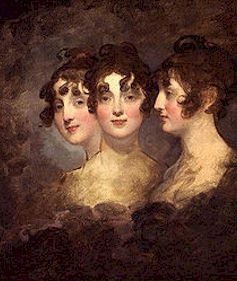|
 |

Part of the American
History & Genealogy Project |
Elizabeth Patterson Bonaparte 1785 ~ 1879


Elizabeth Patterson Bonaparte
Elizabeth Patterson Bonaparte was born in Baltimore, Maryland,
February 6, 1785. She was the daughter of William Patterson, who
came a poor boy from Ireland to Maryland, where he became a
prominent merchant, and one of the wealthiest citizens. She was
a beautiful girl of eighteen when she met Jerome Bonaparte at a
social gathering in Baltimore, and despite the opposition of her
father, a marriage was speedily arranged, the ceremony taking
place with all legal formalities on Christmas Eve, 1803, when
the groom had just passed his nineteenth birthday.
Mr. Patterson's fears that the marriage would be offensive to
the First Consul proved to be well grounded. Attempts were
unsuccessfully made, through Robert R. Livingston, the American
minister at Paris, and through influential persons, to reconcile
Napoleon to his brother's marriage. He ordered Jerome to return
immediately to France, 'leaving in America, the young person in
question." Jerome refused to obey and a year was spent in travel
and in residence at Baltimore. Meanwhile, Napoleon had
proclaimed himself Emperor, and in 1805 Jerome, hoping for a
reconciliation with his brother, took his wife to Europe.
They reached Lisbon in safety, but there Jerome was arrested and
taken to France, his wife not being allowed to land. Her message
to the Emperor was: Madame Bonaparte demands her rights as a
member of the Imperial family." She then proceeded to England
where a boy was born to her and christened, Jerome Napoleon. The
Emperor refused to recognize her marriage, but promised
Elizabeth an annual pension of $12,000 provided she would return
to America and renounce the name of Bonaparte, which conditions
she accepted.
She returned to Europe on occasional visits, where she was the
center of attraction, winning attention not only from her
husband's mother and other members of the family, but also from
the Duke of Wellington, Madam de Stael, Byron, and even Louis
XVII, who invited her to appear at court, but as she still
received a pension from the exiled Emperor she declined. Her
husband married Catharine, daughter of the King of Westphalia.
He then sent to America for his son, Jerome Napoleon, but Madam
Bonaparte refused to give him up, scornfully declining the offer
from her husband of a ducal crown with an income of $40,000 a
year.
The son frequently visited his father's family in Europe, where
he was treated as a son and brother. His subsequent marriage
with Miss Williams of Baltimore caused his mother great anger.
His cousin, Emperor Napoleon III, invited him to France, where
he was legitimized and received as a member of the family. He
declined a duchy, refusing the condition which demanded the
surrender of the name of Bonaparte.
On the death of King Jerome in 1860, Elizabeth Patterson, as his
American wife, unsuccessfully contested his will. The last
eighteen years of her life were spent in Baltimore. She left a
fortune of one million, five hundred thousand dollars, to two
grandsons, Jerome Napoleon and Charles J. Bonaparte. The latter
was secretary of the navy and attorney-general during the
administration of President Roosevelt. Madame Bonaparte died in
Baltimore on April 4, 1879.
Women of
America

Source: The Part Taken by Women in
American History, By Mrs. John A. Logan, Published by The Perry-Nalle
Publishing Company, Wilmington, Delaware, 1912.
|